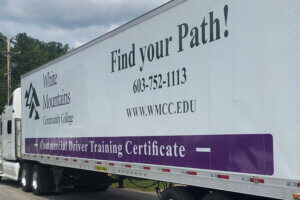Program begins March 14 and addresses workforce demands and new federal training requirements
Littleton, N.H. (February 28, 2022) – Due to a high demand for long-haul truck drivers and other commercial driver professionals, White Mountains Community College (WMCC) is expanding its Commercial Driver Training (CDT) program by adding a new non-credit spring session at the Littleton campus. This addition comes just in time for the implementation of new federal requirements for CDL in February by the Federal Motor Carrier Safety Association (FMCSA).
“In response to the new federal guidelines for additional training at a registered training provider (RTP) and historically high levels of workforce demand, it made sense for WMCC to build off our expertise and current programming to add a new condensed non-credit Commercial Driver Training program this spring,” said Jonathan Girard, WMCC Commercial Driver Training/Driver Education Program Coordinator. “With this new program, job seekers have another opportunity for training in a high demand career and be job ready in as little as eight weeks.”

As part of this FMCSA new requirement beginning in February, all CDL applicants
will be required to complete entry-level training before scheduling a skills test with their states DMV. WMCC’s CDT program begins March 14 and is an eight-week tractor-trailer competency-based driver training program that includes classroom work and in-vehicle training time. The curriculum will include theory, range skills, simulation and on-road driving. Topics include all the basic training skills needed to be a CDL driver including trip planning, maintaining daily logs, Department of Transportation (DOT) regulations, accident reports, pre-trip evaluation, air brake fundamentals, vehicle maneuvers, and safe operation of loaded and unloaded vehicles in a variety of traffic and weather conditions. Students master the wide range of competencies needed to become safe, confident, comfortable drivers. WMCC has seven vehicles in the fleet and a state-of-the-art simulator for student training.
Many employers are offering incentives and tuition reimbursement for CDL training, and eligible students can utilize federal Workforce Investment Act funding for the program. During the summer and fall semesters, the Commercial Driver Training certificate program is available for credit and is financial aid eligible.
The American Trucking Associations estimates that in 2022 the national truck driver shortage will hit a historic high of over 80,000 drivers and at current trends, the shortage could surpass 160,000 in 2030. When accounting for both industry growth and replacing drivers leaving their jobs, the industry will need nearly 1.1 million new drivers over the coming decade, or just under 110,000 per year on average.
Barry Normandeau, the owner of Groveton’s Normandeau Trucking, has worked closely with WMCC’s driver training instructors and has hired WMCC graduates who have remained with the company for decades.
“I believe in putting my money where my mouth is,” said Normandeau. “Almost all my drivers dating back to 1990 came from the WMCC Truck Driver program. The results have been impeccable. I would not hesitate to go back to the WMCC program to get new drivers. They arrive with solid basics that we can further train upon as our drivers require another skillset on top of just being a CDL driver. We have great confidence in the level of training they received at WMCC.”

